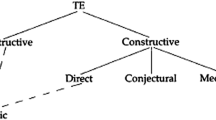Abstract
A characteristic of contemporary analytic philosophy is its ample use of thought experiments. We formulate two features that can lead one to suspect that a given thought experiment is a poor one. Although these features are especially in evidence within the philosophy of mind, they can, surprisingly enough, also be discerned in some celebrated scientific thought experiments. Yet in the latter case the consequences appear to be less disastrous. We conclude that the use of thought experiments is more successful in science than in philosophy.
Similar content being viewed by others
REFERENCES
Atkinson, D. and Peijnenburg, J.: forthcoming, Galileo and Prior Philosophy' Studies in History and Philosophy of Science.
Bishop, M. A.: 1999, ‘Why Thought Experiments are not Arguments’ Philosophy of Science 66, 534–541.
Block, N. et al.: 1997, The Nature of Consciousness, Cambridge, Mass.-London, the MIT Press.
Borsboom, D., Mellenbergh, G. J. and van Heerden, J.: 2002, ‘Functional Thought Experiments’ Synthese 130(3), 379–387.
Brown, J. R.: 1991, The Laboratory of the Mind: Thought Experiments in the Natural Sciences, London-New York, Routledge.
Chalmers, D. J.: 1996, The Conscious Mind: In Search of a Fundamental Theory, Oxford, Oxford U.P.
Churchland, P.: 1985, ‘Reduction, Qualia, and the Direct Introspection of Brain States’ Journal of Philosophy 82, 8–28.
Churchland, P.: 1989, ‘Knowing Qualia: A Reply to Jackson’ reprinted in: Block 1997.
Degenaar, M.: 1996, Molyneux's Problem: Three Centuries of Discussion on the Perception of Forms, Dordrecht, Kluwer.
Dennett, D. C.: 1997, ‘An exchange with Daniel Dennett’ in: J. R. Searle, The Mystery of Consciousness, New York: A New York Review Book.
Einstein, A.: 1916/1923, ‘The Foundation of the General Theory of Relativity’ in H. A. Lorentz et al., The Principle of Relativity: A Collection of Original Memoirs on the Special and General Theory of Relativity, with notes by A. Sommerfeld. Transl. by W. Perret and G.B. Jeffery (New York, Dover Publications).
Einstein, A., Podolsky, B. and Rosen, N.: 1935, ‘Can Quantum-Mechanical Description of Physical Reality be Considered Complete?’ Physical Review 47, 777–780.
Gendler, T. S.: 1998, ‘Galileo and the Indispensability of Scientific Thought Experiment’ British Journal for the Philosophy of Science 49, 397–424.
Hofstadter, D. R.: 1981, ‘Reflections on Searle's “Minds, Brains, and Programs’ “, in D. C. Dennett and D. R. Hofstadter (eds), The Mind's I: Fantasies and Reflections on Self and Soul, New York, Basic Books.
Horowitz, T. and Massey, G. J. (eds): 1991, Thought Experiments in Science and Philosophy, Savage, Maryland, Rowman and Littlefield.
Jackson, F.: 1982, ‘Epiphenomenal Qualia’ Philosophical Quarterly 32, 127–136.
Jackson, F.: 1986, ‘What Mary didn't Know’ reprinted in: BLOCK 1997.
Jong, W. R. de: 2000, ‘Kants Dialectische Opposities (Kant's Dialectical Oppositions)’ Algemeen Nederlands Tijdschrift voor Wijsbegeerte (General Dutch Journal of Philosophy) 92(2), 154–160.
Kant, I.: 1781–1787/1929, Critique of Pure Reason, Hampshire-London, Macmillan Press, Transl. by N. Kemp Smith, 25th edition, 1993.
Kim, J.: 1996, Philosophy of Mind, Boulder-Oxford, Westview Press.
McAllister, J. W.: 1996, ‘The Evidential Significance of Thought Experiment in Science’ Studies in History and Philosophy of Science 27(2), 233–250.
Newton, I.: 1686–1626/1729/1934, Philosophiæ Naturalis Principia Mathematica, Andrew Motte's 1729 translation into English, revised by Florian Cajori (Berkeley etc., University of California Press). Paperback edition 1966.
Norton, J. D.: 1991, Thought Experiments in Einstein's Work, in: Horowitz and Massey.
Norton, J. D.: 1996, ‘Are Thought Experiments just what you Thought?’ Canadian Journal of Philosophy 26(3), 333–366.
Parfit, D.: 1984, Reasons and Persons, Oxford, Oxford U.P. 5th reprint with corrections, 1991.
Pais, A.: 1982, Subtle is the Lord... The Science and the Life of Albert Einstein, Oxford, Oxford U.P.
Searle, J. R.: 1980, ‘Minds, Brains, and Programs’ reprinted in D. C. Dennett and D. R. Hofstadter, The Mind's I: Fantasies and Reflections on Self and Soul, New York, Basic Books.
Searle, J. R.: 1984, Minds, Brains and Science, reprinted in 1989, London etc: Pelican Books.
Sorensen, R.: 1992, Thought Experiments, Oxford, Oxford U.P.
Wilkes, K.: 1988, Real People: Personal Identity Without Thought Experiments, Oxford, Oxford U.P. Paperback Edition 1993.
Author information
Authors and Affiliations
Rights and permissions
About this article
Cite this article
Peijnenburg, J., Atkinson, D. When Are Thought Experiments Poor Ones?. Journal for General Philosophy of Science 34, 305–322 (2003). https://doi.org/10.1023/B:JGPS.0000005164.26228.f7
Published:
Issue Date:
DOI: https://doi.org/10.1023/B:JGPS.0000005164.26228.f7



